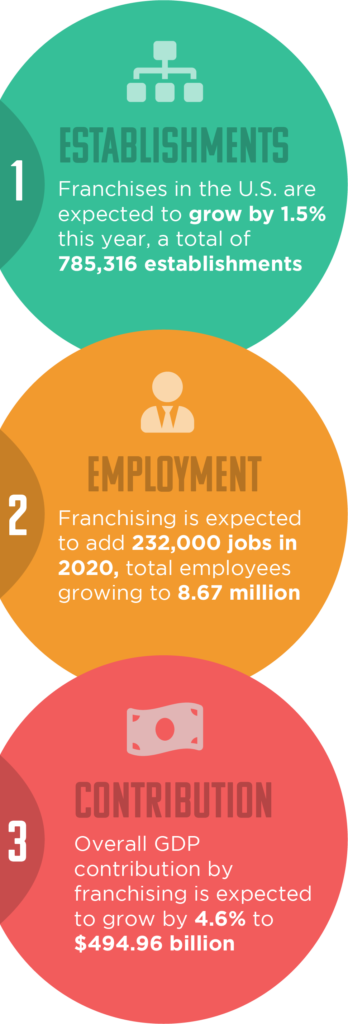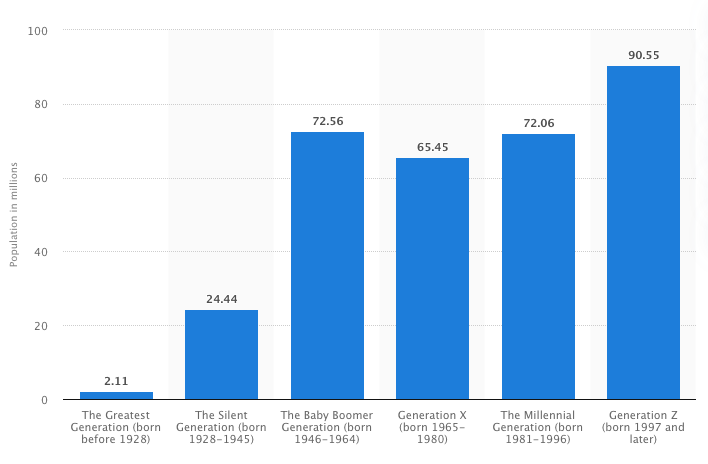What You Missed at the 2020 International Franchise Association Convention
New decade brings new and unexpected challenges for franchise system growth
Thomas Scott, CEO and Founder, Brand Journalists

The International Franchise Association’s 60th annual conference in Orlando remains one of the most important yearly events for anyone working in franchising. This year’s record attendance came with a promise of what’s ahead for us in this new decade.
Franchising is growing; we are expected to add over 232,000 new jobs this year, produce almost half a trillion in GDP and we’re growing faster than the already hot U.S. economy. We estimate there are over 12 million people researching franchising and business ownership at any point today. It isn’t slowing down any time soon!
 2020 arrived on the franchise industry’s doorstep with surprisingly little fanfare. The prior decade was one of massive change for the franchise industry, full of challenging and disruptive technologies, difficult economic conditions and the entry of two new generations of franchise owners into the franchise industry.
2020 arrived on the franchise industry’s doorstep with surprisingly little fanfare. The prior decade was one of massive change for the franchise industry, full of challenging and disruptive technologies, difficult economic conditions and the entry of two new generations of franchise owners into the franchise industry.
The 2010s were also an era of great growth where franchising matured and came of age. The number of franchise systems in the U.S. and Canada almost doubled in this period with almost one new franchisor starting up daily. Franchising is now the career choice of entire new generations and for millions of younger entrepreneurs, business ownership is now plan A, leaving a job as plan B.
As disruptive as the 2010s were for franchising, the 2020s are stacking up to be even more of a challenge. For companies that take the time to understand what’s ahead, these challenges could end up as massive opportunities to grow. The theme of this year’s record attendance conference is Franchising’s Future Starts with Us. Franchising’s future is here; the question is:
Are you missing what’s important to buyers today?
We’ve entered into unchartered waters – franchise buyers are not just getting younger; they have radically different expectations of franchise companies. They gravitate to brands that cater to their emotional needs, provide transparency and authenticity and look for cultures that allow them to collaborate. Technology is shifting – again – and the days of recruiters being able to email, or phone prospects are seriously numbered. Franchise buyers are not using Google – or websites for that matter – as much as they are using social networks and web apps. Getting in front of buyers and coming up with fresh, contextual marketing is proving to be far more difficult to execute.
Franchise broker networks are struggling; in a tight job market, their traditional buyer is getting pulled back into a job with little reason to pursue franchise ownership. This forces companies to think differently about development and try to reach buyers that broker networks can’t.
Here are some important takeaways we gleaned from this year’s conference, both from sessions, roundtables and fascinating conversations in-between:
Collaborative culture isn’t just a good idea, it is the only way to grow a franchise system in the 2020s.
Franchisors don’t know their culture or understand the impact of the culture they create are opening themselves to unnecessary problems and extra cost.
“everyone has a plan until they get punched in the mouth- Mike Tyson”
The conventional wisdom is out – for anyone starting, operating or restarting a franchise system, there is only one type of culture that really works: collaboration. The number one problem that forces young franchise systems to stall or fail is a basic one: they don’t understand the role collaborative culture plays in healthy system growth.
There are two styles of culture and leadership common in franchise systems:
Command and control – think the IBM, org-chart style of leadership. Someone at the top, layers to the person at the bottom. Top-down culture is cumbersome and info moves slowly. Top-down culture lends itself to compliance enforcement and focuses on rules from the ivory tower and not the health of the franchise relationship. Command and control cultures are prevalent in franchising and it is a cancer! Of the past six emerging franchise chains we’ve worked with, 5 imploded or went off the rails because they couldn’t or wouldn’t let go of command and control leadership culture. It is the single most prevalent reason we see franchise systems fail.
If you think you are the expert – that franchisees can’t possibly know more than you, that this franchise system is your baby and the main reason franchisees buy your franchise is so they can follow a system, you are probably guilty of implanting a cancerous culture that will end up killing growth.
Collaborative culture – franchising at its base is a relationship. Talk to successful franchisors and they are close, personal friends with their franchisees. They work together on an equal playing field and collaborate on how to grow the business. Both parties prosper. The business case for building a collaborative culture franchise system is strong – a small franchisor can grow with 25% of the capital needed a command and control franchisor needs. Collaboration cuts costs and speeds up development. Collaborative culture franchise systems are simply higher performance because they focus on the relationship and give stakeholders – the franchisees – a major say so in operations, direction and system development. Franchising isn’t a democracy, but it needs to be much closer to an inclusive democracy than a totalitarian regime.
Here’s the checklist of collaborative culture takeaways:
- Form fast action, development or advisory committees with franchisees and home office staff. Meet often – weekly – and have these meetings replace your corporate staff meetings as much as possible. Don’t roll any initiative out unless the committee researches the ideas, agrees on the need and vets the idea. It isn’t the role of your home office staff to come up with systems – franchisees expect to participate in this as they are your most capable and most experienced subject matter experts. Committees made up of majority franchisees can make a HUGE difference in culture.
- Communicate in non-email methods. Email is also problematic and the worst possible way to communicate with your franchisees. Greg Nathan proposed that in a healthy system, you would communicate 6 or 7 times about a topic before you rolled it out in an email. Human communication – phone calls, conference calls, video calls, regional meetings, field visits – these are the ways you build solid collaborative culture. Lazy or inexperienced franchisors rely on email and email newsletters.
- Change is hard and with change comes loss. In a collaborative culture, you have to call out the loss, discuss it and be empathetic with your franchisees so they can grieve. If you don’t, you’ll get universal dismissal on your efforts and you’ll face fierce opposition. Just make sure to start with what’s going away before you roll your ideas out.
- Be willing to compromise! In a collaborative culture, be willing to step back and go back to the drawing board. You might not be on the right track!
- Encourage ideas from the field – in the main session Monday, the CEO of Kentucky Fried Chicken related how the first franchisee developed the red and white bucket and came up with the tagline ‘finger licking good.’ Your franchisees are your brain trust – listen to them and take their advice! Even if their ideas are different than yours, you’ll make happy, engaged owners by giving them a voice and listening to them.
- Lastly, don’t roll anything out without a business case. Because of its focus on relationships, franchising is an emotionally oriented business. Making a detailed business case with real data keeps the conversations focused on what really matters. You have to get the why and what’s in it for your franchisees or you won’t get traction. You can’t really ‘TELL’ a franchisee to do something, even with the backing of your FDD, and have things go smoothly. Business cases with transparent data helps franchisees sell themselves on the idea.
These sound like operations and leadership ideas and they are – we think they are the most important takeaway this year because without a collaborative culture, you won’t be able to grow or sustain growth. Franchisees work hard and if you implement a command and control culture, you’ll kill relationships with your pioneers, squash validation and create a tense franchise culture that puts franchisees and home office staff in opposition. In today’s emotionally oriented business environment, making real, authentic collaboration is a critical step to growth.
A franchise purchase isn’t an opportunity to follow a system, it’s a path for professional development
Best-selling author and thinker Simon Sinek gave an excellent keynote presentation this year on how to play the infinite game – focusing on the long term and growing a thriving business that has no real finish line. His big take away for many was to focus on younger staff at franchise companies and we think it applies to franchisees too.
Younger franchisees today are looking for more than a business to own. They don’t want to just learn a system or train for a job; they are looking for a path of professional development and a way to evolve as a businessperson and human being. Millennial and Gen Z buyers made up almost 35% of all buyers in 2019 and that number is going to increase dramatically this decade thanks to the sheer size of their generations.
These buyers have very different expectations for what they expect a career path to look like and when it comes to franchising, they are seeking mission and mentorship in a franchise purchase. The problem is most systems are focused on training a franchisee how to operate the basic business model, not how to professionally develop a young owner into a robust and capable business owner.
Without a path for professional development, these young owners will just do what they are famous for doing in the job market – ghost you. Be intentional about the path you create for young owners and they will reward you with loyalty and high performance. It isn’t that younger owners are slackers or lack the work ethic needed to succeed; to be successful and grow a franchise system in this decade you’ll need to create an environment they want to be in.
Franchise Broker deals down
Broker deals are down 12% in 2019 from 2018. The average company in franchising generated 1.7 deals from brokers in 2018 and less than 1.4 in 2019. Broker deals remain a viable source of deals for some brands and there is a place in the franchise industry for them. We talked to several high-profile brokers about this and they each responded with something very similar:
“We wish the job market would slow down – most of our best prospects are getting sucked into the job market.”
This is partially true – there is a historical connection to a tight job market and the number of people entering the franchise industry as franchisees. For some types of buyers – especially older, corporate refugees leaving career jobs and seeking income replacement – a tight job market competes favorably with franchise ownership.
We would say that the problem brokers and broker networks are seeing is more a reflection of poor or narrow targeting – focusing on the 50 plus year old corporate manager – than it is a sign on the economy.
We often intentionally avoid that type of franchise buyer in our lead generation efforts – we believe in targeting much more specific and often younger groups. People who are not as easily lured back into the job market. These days, that might mean much younger franchisees, ethnically diverse populations of potential buyers or targeting specific job types from industries in decline where a franchise solves a specific pain point and offers someone a better, more profitable path forward in their career.
Even if you have a solid value proposition for a prospective owner, if they are trying to replace a stable 200k a year income, few franchises can replicate that, much less make a low-risk option for this person. Someone who gets immediate income expansion or has some other critical pain point met will see a franchise as a much more attractive choice.
Sadly, until brokers and broker networks begin thinking differently about who they are targeting and why that person connects with the opportunity, we’ll continue to see more declines in broker sales.
Which brings us to our next takeaway:
Targeted, contextual marketing to specific types of franchisees is the new normal
Franchise buyers are not monolithic!
In our experience helping brands recruit over 10,000 new owners, few actual franchise owners start out simply unhappy in their job and decide to buy a franchise. That journey is a myth and there is little to no real data to back up the idea.
What we do see is specific groups of franchise buyers – we call them personas – relating emotionally to specific types of brands. These people might have a common pain point in their lives – such as the example Marcus Moura gave in his excellent session about why pharma reps invest in his Amada Senior Care franchise. In his experience, certain reps at certain companies are disillusioned with the industry they are in and home care offers a positive career change. They are not looking to get another job – they want out. A franchise opportunity that leverages their skills is simply a BETTER path. Targeting these prospects leads to higher quality conversations and a better fundamental fit.
Some examples of targeting today:
- A carpet cleaning or flooring franchise might target realtors because they deal with home prep and are exposed to a constant stream of customers
- An IT company might target copier salespeople because selling office equipment is a tough industry with little good news and those prospects have the skills to succeed at selling IT services to businesses
- A plumbing business might target mid-level or area managers at an unrelated home services business such as Orkin or Terminix because those skills are easily adaptable to plumbing and the income potential is much higher.
- Food franchises might target managers and operators from struggling corporate run chains because they can use their skills to step up to the next career level.
If you have a very specific audience you want to go after, the cost per deal is potentially lower because you are far more focused on specific conversations.
Who you target depends on your specific business and the industry segment you are in. Marcus is smart to target pharma reps because they have the skills a top-performing franchisee has.
Targeting doesn’t replace other forms of lead generation – most systems have 6 or 7 different personas they need to target. Some are broad, such as people who want to open a coffee shop. Some, like Marcus’ funnel, are more specific.
The takeaway is simple – you should be building personas of who your target franchisees are and making sure some portion of your franchise development marketing is focused on generating leads from each of the personas you target. As big data and marketing platforms have gotten more robust and detailed, you can now target personas on LinkedIn, Facebook, Adwords and in a variety of other ways.
If you just focus on broad marketing, you’ll likely miss out on some easier to convert franchise sales.
Time to Take Younger Franchise Buyers More Seriously
In the work we’ve done with brands, we’ve seen a massive spike in recruitment from young Gen Z buyers who are mid 20s and younger. Gen Z is the most entrepreneurial generation we’ve ever had in franchising and for them, franchise ownership is very attractive. Gen Z is enormous – there are almost 20 million MORE Gen Z members than there are Millennials and they were raised on stories of entrepreneurship. They are unafraid of failure and willing to work hard. Best of all, they are the most adept generation and self-directed learning, having never lived without access to YouTube.

Source: Statista
As we see buyers begin to come of age, there is a significant transfer of wealth from Gen X parents to their children and a massive resurgence in family business ownership.
Conventional wisdom is that parents who inquire for a franchise that the kids can run is a bad idea. So much so that most systems dismiss these types of buyers, thinking that the kids are slackers, unable to get a job, and nobody wants a slacker in their system.
The evolution of this group is that there are thousands of young buyers who want to build a franchise empire, have a passion for a specific franchise industry and have access to capital through their parents. Parents who are more than willing to invest in their dreams.
Unfortunately, we’re dismissing the vast majority of these buyers by using heavy handed financial screening up front.
The takeaway was simply that younger buyers have more potential than we thought, and they need more conversation around financing a deal before you kill them out – you won’t know what resources they have until you’ve spent time with them. These young buyers are the future and the next one you recruit could evolve into a massive multi-unit owner by the time they are really old. Like 35 or 40.
Sales processes are conversational, not linear
With franchise buyers coming from several generations and from a wide variety of buyer personas, we are still trying to force everyone through the same, rigid sales process. Perhaps the biggest killer of deals is just not taking the time to slow down and get to know your prospects. What do they want? What are they trying to accomplish?
Several attendees at the franchise sales roundtables talked about how flexibility in the sales process is now a necessity. All buyers need to end up at the same point with the right amount of education and with the same amount of documentation and that doesn’t mean they need to follow the exact path.
How they get there varies and smart recruiters are simply asking candidates up front “what does your buying process look like; what do you want to know and how do you like to learn?” Gaining permission by asking opens the door for you to help design a discovery path the prospect appreciates. This creates more momentum in the process for both parties and makes it more efficient.
The death of the webinar
We heard from multiple recruiters that traditional webinars are fading away, getting replaced with other conversation types or other media. A webinar was excellent in an era when everyone was on a desktop or laptop; they are very challenging if your prospects are using mobile phones to communicate with you.
Think about it – if you are talking to a recruiter at home or on a lunch break or over a weekend, your smart phone is the device you are most likely using. Attending a webinar on a phone is near impossible, resulting in a lot of no-shows.
Recruiters are replacing webinars with structured voice conversations, video chats, podcast recordings or conversational videos. In short, take the webinar info and break up the content into material you can share during or after calls.
We especially liked the idea of podcast libraries of 15- and 20-minute recorded conversations that cover important topics such as:
- An interview with the CEO about the future of the brand
- A conversation with the COO about what is driving sales increases
- Franchisee stories about specific owners and what their daily life is like
- Your trainer talking about what you learn and explaining the onboarding process
- A podcast about the most commonly asked questions
- What to expect from Discovery Day
- A conversation with a lender about financing options
Making shorter conversations prospects can listen to on their commute is a great and universally popular way to educate them.
Your phone will stop working shortly
Think about the typical phone call – our entire approach as an industry towards how we communicate with prospects is based on salespeople hitting the phones. We measure sales activity using phones, spend a lot of time thinking about contact rates and expect our salespeople to be physically connected to a phone ALL DAY.
What would happen if you weren’t able to call your leads? What if nobody ever picked up a call and you couldn’t get to a real person, no matter how many calls you made?
Phone carriers are already blocking sales calls, labeling them as ‘telemarketers’ or ‘spam’ calls. Apple recently rolled out a new feature that sends any number not in your contacts or email automatically into your voicemail, so you won’t be bothered by salespeople calling you.
The day is fast approaching where we’ll need a viable way to reach out to leads and avoid the initial phone call. We’ll focus more on scheduling calls and chat / text / SMS push notifications to communicate with prospects.
If you work in just about any modern office, Slack is now a mainstay. In our office, we communicate via Slack channels and we don’t use email, phone calls or even texting. In some organizations, Facebook messenger, WhatsApp or other messaging systems have taken over.
Texting, thanks to companies like FranFunnel, is helping break this barrier down. For our sales clients, we auto text all leads, and it results in an average 28% contact rate before we make the first call. Auto texting is just the beginning. The future might involve Facebook messenger, push notifications, text-based lead nurturing campaigns and a variety of other non-phone call tactics. These technologies are evolving quickly – it is time to start thinking hard about what the future looks like!
What’s Next?
The decade ahead is promising. Although there is some uncertainty, we don’t have any looming bubbles about to burst and our economy looks strong. Younger buyers are entering franchise systems as owners and brands that can adapt and stay relevant will thrive.
What were your takeaways from the 2020 IFA Convention?
About Brand Journalists
Brand Journalists uses a specialized team of former newspaper writers and video journalists, matched with some of the best designers and SEO / PPC / SEM practitioners in the country, to produce high-performance recruitment websites and franchise lead generation campaigns that far exceed industry norms. We’ve grown over 180 franchise brands and helped development teams recruit over 10,000 new franchise owners since our inception in 2008. We’re based in Nashville, TN.
Download our capabilities deck here

